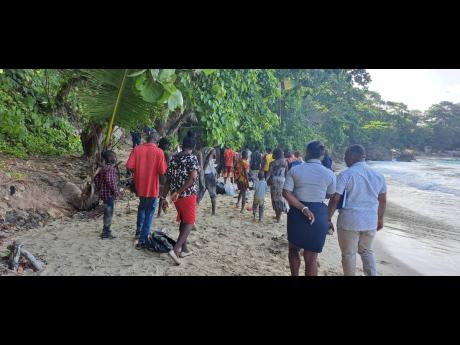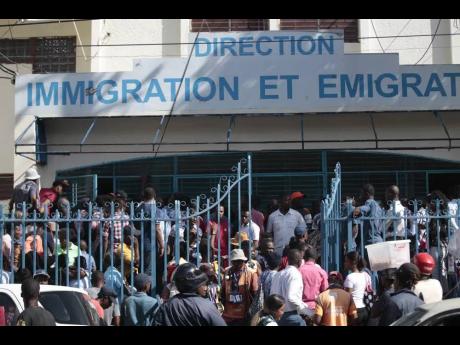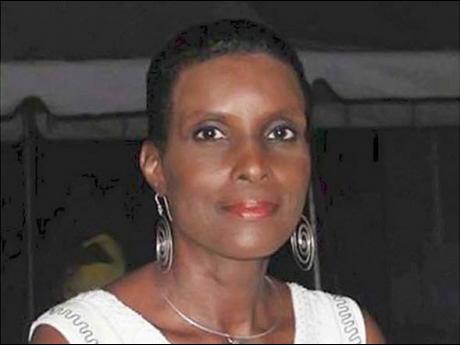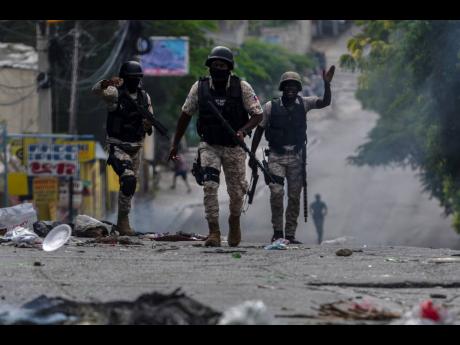Myrtha Désulmé | Thirty-seven Haitians ...
Long before Gaza, a genocide was being perpetrated right next door against the Haitian people by vicious gangs sustained by a criminal and illegitimate government and their foreign hegemonic backers, who are maintaining an illegal dictator in power. The catastrophic violence in Haiti has been internationally well documented. It has made life utterly impossible for Haitians, and fuelled internal and external displacements by people whose entire neighbourhoods have been burned to the ground and the inhabitants massacred.
On August 12, Jamaicans were horrified by the events which unfolded in Gregory Park. Eleven houses were firebombed by criminals. Two people were killed, including an elderly lady who was trapped in the fire inside her home, and one man who was shot while trying to escape the fire. Over 40 were left homeless. There was a national outcry that Jamaica had reached an intolerable level of terrorist violence! Well, imagine that Haiti is one big Gregory Park, all day, every day, causing hundreds of thousands of victims to have to live on the streets, in schools, in warehouses, and even in cemeteries! And the worst part is that they don’t even have any prime minister flanked by government officials coming to commiserate, express outrage, promise justice, and offer a shoulder to cry on, because it is the government itself that is behind this terrorism. As a result of this, nowhere is safe in Haiti, and thousands have been forced to risk their lives on the high seas, taking their children on rickety boats in shark-infested waters, like people jumping to their deaths from a burning building. When these terrified survivors’ boats hit land in Jamaica, and they breathe a sigh of relief, thinking that they have finally found a safe haven, it is only to encounter the egregious inhumanity of being bundled up in the middle of the night, and thrown back into the burning building from whence they had barely managed to escape.
FIRST TO COMMIT
Yet, Prime Minister Andrew Holness was the first leader to commit to sending members of the security forces as part of a multinational force to restore stability to Haiti, premised on his “deep concern about the humanitarian and security crises being experienced by Haitians.”
On January 31 during a ministerial statement in the House of Representatives, PM Holness declared that the people of Haiti continue to have their human rights threatened by powerful gangs and militias which perpetrate heinous crimes, including killings, kidnappings and acts of violence against women and children. Holness also pointed out that there are several persistent and deteriorating emergency level crises in Haiti, including the fact that nearly five million Haitians face acute hunger. He noted with interest an initiative being contemplated within the OAS to strengthen the organisation’s response to the increasingly complex and challenging situation, and vowed that Jamaica would remain closely involved in efforts within this body to develop constructive approaches at the hemispheric level. The PM further highlighted the fact that from a bilateral perspective, Jamaica and Haiti are neighbours enjoying longstanding good relations and partnerships.
On July 10, 37 Haitians including eight children and a pregnant woman collapsed on the PM’s doorstep testing the sincerity of these seemingly heartfelt sentiments. The Haitians were promptly detained, hauled before the court, convicted of illegal entry, fined, and deportation proceedings were quickly put in motion. The Refugee Convention enshrines the principle of non-penalisation for irregular entry, which means that the Haitian nationals, who are moreover CARICOM citizens, should not be excluded from international protection because of a breach of entry requirements, or even worse charged a fine for it, when all they possess are the clothes on their backs, which they managed to escape with. The Refugee Convention also enshrines the principle of non-refoulement , which entails a requirement that every refugee has access to an effective procedure for the individualised assessment of their international protection needs in accordance with due process. This principle has acquired the status of jus cogens, that is, a peremptory norm of international law from which no derogation is permitted. Jamaica’s Refugee Policy explicitly refers to the Refugee Convention.
GASLIGHT
At first, the government tried to gaslight the public that the Haitians were not seeking asylum, as if they were passengers on a cruise ship which had drifted off course and mistakenly ended up in Jamaica, and were therefore delighted to be assisted to return to their place of origin, instead of desperate victims who had escaped on the high seas with their children in tow, to save their lives. When the media got a hold of their request for asylum and published it, the government was forced to go through the motion of processing the refugees’ asylum applications. It then issued a press release asserting that the applicants were being treated in line with Jamaica’s Charter of Fundamental Rights and Freedoms and the Refugee Policy.
The press release ended by stating that the Government of Jamaica remains sensitive to the unstable conditions in Haiti and re-affirms its commitment to working to secure positive outcomes for all relevant parties. But while claiming to comply with the Refugee Policy, and asserting that it remained sensitive to the conditions in Haiti, when the next 3 sets of Haitians arrived, the government dispensed with the most basic requirements and rushed to bundle them off in the middle of the night so that the lawyers would not have a chance to get to them to collect their asylum requests. Human rights lawyer Malene Alleyne literally risked her life, not only driving by herself at night on some terrible roads, to some god-forsaken corners of Portland to meet with the refugees, but upon arrival, she was mistreated, refused access, and doors of police stations which are supposed to be open 24 hours were locked in her face. She was made to sit outside for hours in the middle of the night, intimidated by soldiers carrying AR15s, in order to prevent her from speaking with the Haitians, so they could be hastily deported even while she pleaded with the authorities to respect the refugees’ right to legal representation.
Since September 2021, four UN Agencies, UNHCR, IOM, UNICEF, and UNHCHR have issued a joint statement calling for “protection measures and a comprehensive regional approach for Haitians on the move.”
Last November, the UN Refugee Agency made an urgent call for countries not to forcibly return Haitians fleeing their country, because of the “devastating humanitarian and security crisis” there. The UN and Inter-American Human Rights Commissioners urged OAS members to “stand in solidarity with Haiti” and not to return Haitians “to a country that is extremely fragile.” They reminded States that “Haitians who wish to seek international protection should have access to fair and efficient asylum procedures” because the systematic violations of rights and unremitting armed violence in Haiti have precipitated the country’s descent into its “worst human rights and humanitarian situation in decades.”
URGENT ACTION STATEMENT
Last April, the Committee on the Elimination of Racial Discrimination, chaired by Professor Verene Shepherd, issued an urgent action statement expressing concern about the collective expulsions of Haitians without a proper assessment of the protection needs of each individual case and called on States to suspend forced returns.
But the Jamaican authorities seem to believe that just shouting “smuggler!” gives them a pretext to summarily deport an entire group of vulnerable individuals, including children, who are in fact in search of protection.
Prime Minister Holness was the first head of state to claim an interest in taking leadership of the Haitian crisis. Well, what does leadership look like? Leadership looks like what the PM has said himself: that Jamaica would remain closely involved in efforts within the OAS to develop constructive approaches at the hemispheric level. Or were those more empty words? Leadership is coordinating with humanitarian agencies and non-governmental organisations like the United Nations High Commission for Refugees, the International Organization for Migration, the Red Cross, UNICEF, Food for the Poor, and so many others, to organise hemispheric efforts between those who have expertise in this area to provide assistance, protection, and humane treatment to those in need. What Leadership does not look like is bundling desperate suffering people off in the dead of night to throw them back into a burning building, while gaslighting the public that they had no interest in seeking asylum, or were ‘not landed’.
Since 2014, 7.7 million Venezuelans have fled their country with significant flows in the Caribbean region. Have we ever heard any argument about not opening the floodgates? No! The region has come together to resettle these non-CARICOM nationals, and given them every kind of support. Should we conclude that the discrimination against Haitians stems from pure unadulterated racism and anti-Haitian prejudice?
Myrtha Désulmé is an advocate for Haiti. She is the founder and president of the Haiti-Jamaica Society, and represents the Haitian Diaspora in the Montana Group, a civil society movement working to resolve the ongoing Haitian crisis. Send feedback to myrtha1804@gmail.com and columns@gleanerjm.com




